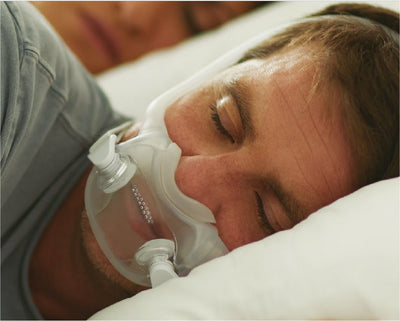While using a CPAP machine is generally regarded as the best way to treat obstructive sleep apnea, many patients give up on their treatment after only a few weeks or months.
The issue isn’t that CPAP therapy doesn’t work. Instead, studies have found that the most common reason why someone stops doing their therapy is because of issues with their mask.
As discouraging and frustrating as it may be to experience negative side effects from your CPAP mask, it’s important to remember that this isn’t an unsolvable problem. Mask side effects are a real issue for many, but they may be easier to resolve than you might expect.
Leak-Related Side Effects

Air leaks are perhaps the most common CPAP mask problem. This occurs when the mask does not fit properly against the face, allowing air to leak out. This is most common with full face masks, particularly in areas such as the bridge of the nose. Nasal pillows are the least likely to experience such leaks because they are inserted into the nostrils.
Leaks are most likely to occur when the mask is not a proper fit for your face shape, or when it isn’t adjusted to fit snugly against your skin. As air escapes throughout the night, you may not get adequate air pressure from your CPAP machine. As a result, the quality of your therapy will be compromised, and you’ll likely still feel tired in the mornings.
In addition to ongoing fatigue, dry eyes are commonly associated with leaky masks. As air leaks around the bridge of the nose, it tends to go right into your eyes, leaving them red and irritated.
Pressure Issues

You might think that you would immediately be able to tell if your mask was too tight for your face. But this isn’t always the case. In your efforts to create a snug fit, it is surprisingly easy to pull those straps just a little too tight. You might think some minor discomfort is normal, but it isn’t.
When your mask is strapped too tightly to your face, it can leave deep impressions in the skin. The skin may become red and irritated because of the added pressure it is subjected to throughout the night.
When the mask is too tight to your face, you may also get redness and bumps on your nose and in other areas. This is because the headgear straps have been pulled too tight. Eventually, this can create painful sores on your face. In extreme cases, keeping your mask too tight could even lead to bruising or cause open sores to form.
Why You Shouldn’t Give Up on CPAP

As frustrating as these CPAP mask issues can be, they aren’t a sign that CPAP therapy isn’t for you. Rather, they serve as an indicator that your mask needs adjusting — or replacing.
For example, if you have a leak that blasts air into your eyes, you could benefit from adding an extra nose cushion or nasal pillow to the mask setup. By keeping the mask flush with your skin, leaks are far less likely to occur, and your eyes won’t get dried out at night.
You should not try to over-tighten your mask to stop air leaks — as previously noted, this will just create a new set of problems. To avoid over-tightening your mask, you should make small adjustments on each strap to ensure consistent tightness. A mask that is too tight in some areas but relatively loose in others could cause both facial sores and leaks.
If your mask is consistently giving you trouble after you’ve made some adjustments, you may simply need to get a new mask. A mask that is the wrong size for your face is far more likely to cause negative side effects that create discomfort and compromise the quality of your CPAP therapy.
Fortunately, most manufacturers offer their equipment in a variety of sizes to better fit different face shapes. For example, to get your size for a full face mask, measure the length from the bridge of your nose to just below your lower lip to get your “height.” Then, measure the width of your mouth when it is in a neutral position. Use these measurements to determine if a small, medium, or large mask is the best option.
If your face isn’t an exact match for a manufacturer’s available mask sizes, go with the closest option. Or, you could see if a different manufacturer offers mask sizes that are a closer match for your face. Doing some research before buying a mask will help you save time and ensure a comfortable transition to CPAP therapy.
Get the Right CPAP Mask With Help Medical Supplies
Whether you simply need replacement parts for a mask you love, or you need to try a new mask that will fit more comfortably, you’ll find a great selection and affordable prices at Help Medical Supplies.
We offer a wide range of full face masks, nasal masks, and nasal pillows from Philips Respironics, ResMed, and more. Better yet, many of these masks are available at discounted prices off MSRP to help you save even more on these necessary supplies.
Worried about making a big payment on CPAP equipment all at once? You can split your purchase into four interest-free payments to better fit your budget. We’re all about helping you make your sleep apnea therapy affordable and convenient, the way it should be. This way, you can enjoy quality sleep and a comfortable mask fit.

